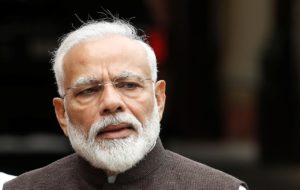India’s Growing Misinformation Crisis Poses A Threat To Democracy

While legal mechanisms are in place in India, several challenges persist in effectively regulating misinformation (Christoph Scholz Flickr)
Six years ago, in the backdrop of a suicide bombing attack in Kashmir’s Pulwama district that killed at least 40 Indian security forces, a recording of a call, purported to be between a top Indian minister and a senior functionary of the ruling BJP, and an unidentified woman, was posted by a Facebook user on his timeline.
It took little time for the post to go ‘viral’, a euphemism for the rapid and widespread popularity of social media content. Before the post was taken down by Facebook, it had clocked 2.5 million views and 150,000 shares. Edited versions of the original were viewed 36,000 times on Facebook, 2,800 times on YouTube and 22,000 on the erstwhile Twitter.
The video was later found to be fake.
Questionable social media posts and hundreds of thousands of fake videos exploded onto India’s digiscape with the exponential growth in the number of WhatsApp and social media users.
The rapid and unchecked proliferation of such videos over time suggests that social media companies can do little to prevent rampant spread of falsehoods by not just ordinary people but also organised groups with political affiliations. Even the mainstream media has been “vulnerable” to the “explosion of misinformation”.
The World Economic Forum’s 2024 Global Risk Report, which warned that “misinformation and disinformation” will “further widen societal and political divides”, ranked India – with 50 percent internet penetration – at the pinnacle of this global trend.
This unenviable distinction was achieved for the second consecutive year, with the report attributing the origin and dissemination of falsified information to the country’s increasing internet penetration and growing social media consumption.
An estimated 806 million individuals used the internet in India at the start of 2025, when online penetration stood at 55.3 percent, which makes it one of the largest digital populations in the world.
Thus, the increasing accessibility of the internet, coupled with the unprecedented expansion of digital platforms, has provided a space for information exchange. However, it has also resulted in the rampant spread of misinformation. This is not just a technological challenge but a societal threat, often leading to polarisation, communal tensions and even violence.
Negative consequences
More importantly, the WEF report warns that misinformation and disinformation could “seriously destabilise the real and perceived legitimacy of newly elected governments” and have long-term negative consequences for “democratic processes”.
Misinformation in India is not new. Still, it has grown exponentially in recent years with the use of smartphones and social media platforms.
A critical factor contributing to the emerging crisis is the lack of media literacy among the population. An expanded understanding of literacy includes the ability to access and analyse media messages and create, reflect and act by using the power of information and communication to make a difference in the world.
However, when uncertainty is high, individuals are more likely to seek explanations that provide clarity, even if those explanations are based on misinformation or disinformation. In such moments, misinformation – false or misleading information shared without intent to deceive – can spread rapidly. The disinformation campaigns exploit such uncertainty, while misinformation exemplifies fear and confusion.
One example is the COVID-19 pandemic, which highlighted the risks of unchecked information flow as unsubstantiated claims and conspiracy theories flooded social media. False cures and disinformation presented as fact posed a serious threat to public health and safety.
However, the consequences of misinformation extend to political discourse, social stability and governance. Political propaganda and fake news reports have the potential to influence elections, incite violence, and manipulate public opinion, often targeting vulnerable communities. Indian political parties are not immune to such information malignancy.
In this context, countering disinformation campaigns is necessary. Internationally, various UN agencies have taken steps to regulate misinformation while ensuring freedom of expression.
Combating the menace
UNESCO advocates a rights-based approach to combating disinformation, emphasising the need to balance regulation with freedom of speech. At the same time, another international organisation acknowledges the adverse effects of misinformation on democratic institutions and human rights. Besides, a 2023 UN policy brief calls for global cooperation to curb disinformation while preserving freedom of speech.
At India’s domestic level, the Information Technology Act, 2000 (IT Act) & IT Rules, 2021, mandate social media platforms to remove false or misleading content flagged by the government. The Intermediary Guidelines and Digital Media Ethics Code obligates tech companies to counter misinformation.
In 2023, India introduced new measures to strengthen the legal framework by amending the IT Rules which proposed a government fact-checking unit to identify and address false information related to government policies. As a result, social media platforms, including Twitter, Facebook and WhatsApp, must comply with official takedown requests to curb misinformation.
Despite these legal mechanisms, several challenges persist in effectively regulating misinformation. While these rules aim to curb misinformation, granting excessive power to the government may stifle free speech and press freedom.
The sheer volume of content shared makes it difficult to monitor and fact-check every piece of information. Misinformation often spreads faster as its sensational claims attract more engagement than factual content.
Balancing free speech and regulation remains a significant concern, as excessive regulation may infringe on fundamental rights under the Indian constitution. At the same time, jurisdictional issues pose another challenge, given that misinformation spreads across national borders, making enforcement difficult.
Regulating misinformation and disinformation requires a nuanced approach that upholds legal enforcement while protecting fundamental freedoms. While international and national legal frameworks have made significant progress in addressing these challenges, continuous adaptation and international cooperation are necessary to counter emerging threats in the digital age, especially with the advent of AI technology.
Thus, addressing this crisis requires a multi-faceted approach, such as strengthening digital and media literacy programmes, particularly in schools and universities, to empower them with critical thinking skills.
Social media platforms must also take greater responsibility by self-regulating and curbing the spread of misleading content. AI and machine learning tools may help detect false information, allowing human moderators to remove harmful content promptly.
As India continues its digital transformation, ensuring that truth prevails over falsehood must be a top priority, and combating misinformation is essential for upholding national values and ethos under the Indian Constitution.
The government, tech companies and civil society must work together to find a unified solution to the issue of misinformation. Public awareness campaigns and ethical reporting standards that avoid sensationalism may help individuals distinguish between credible and unreliable sources of information.
As misinformation threatens the very fabric of society, it is pertinent that individuals also verify any information before sharing it. Fact-checking organisations may play an essential role in debunking false information.
As the world’s largest democracy, India must lead by example, fostering a digital ecosystem that prioritises truth, transparency and trust in democratic institutions by protecting not only individuals from any harm due to misinformation but also the democratic values that define India, making it a more informed and resilient society.
(Published under Creative Commons from 360info™. Read the original article here)





